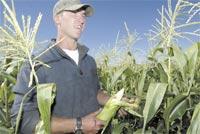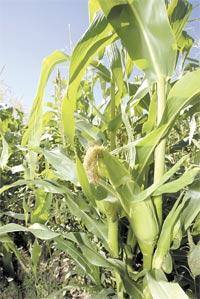|
http://www.heraldandnews.com/articles/2005/09/08/news/agriculture/ag1.txt
Such a
sweet success
 |
| Ry
Kliewer holds an ear of sweet corn from his
4-acre corn patch south of Klamath Falls.
Kliewer has enjoyed growing the
frost-sensitive crop and considers the corn
an experiment. |
|
Herald and News September 8,
2005
It's been a sweet bit of work - and a learning
experience, too.
Ry Kliewer is in his second
year of growing an uncommon Basin crop, sweet corn,
on 4 acres along Delfatti Lane south of Klamath
Falls.
"This has been our little experimental plot,"
Kliewer said.
Kliewer is growing two early
maturing varieties, a 67-day yellow variety and a
72-day bi-color corn, which he's been selling
locally to Sherm's Thunderbird Market.
"We sold about 6,000 to 7,000 ears this weekend,"
said Norm Aldinger, produce manager at Sherm's
Thunderbird Market. Aldinger said the store was
close to selling out of the first delivery of corn
Tuesday morning.
And not just the customers were eating it up.
"Gosh, they sure were good," Aldinger said.
Finding corn grown in the Basin is an uncommon sight
in the produce section of most grocery stores.
"We usually handle Medford corn, which is the
closest we've got," Aldinger said. "But this is
right out our back door. I kind of like to support
the local farmer here - try to work with them a
little bit."
The second variety of
corn, the sweeter-tasting bi-color, should be
harvested on Friday, said Kliewer, and it too, will
be sold to Sherm's.
Kliewer and his wife
Laurinda grow 250 acres of mostly organic alfalfa
and grain. Growing corn is different than the other
crops Kliewer is used to raising.
"It's fun to watch corn grow, in my opinion,"
Kliewer said of the fast-growing crop. "You get to
see what you put into it."
And even though the frost-sensitive crop isn't
usually grown commercially in the Basin, it's a
fairly common sight in many back yards.
"It grows here quite well,"
Kliewer said. "People grow it in their gardens all
the time. At this elevation you can grow really good
sweet corn," Kliewer said.
This is Kliewer's second year of growing corn on a
4-acre plot owned by Jason and Shawn Blodgett.
 |
|
Sweet corn grows on Ry Kliewer's 4-acre plot
south of Klamath Falls. Kliewer has been
selling his corn to a local grocery store. |
|
Last year Kliewer harvested only 2,000 ears,
which he sold at Ray's Food Warehouse. Frost claimed
the majority of the second variety of that crop just
as the ears were ready to pick.
"That was a heartbreaker," Kliewer said.
He estimates he would
have had 10,000 ears from what was destroyed by
frost.
This year Kliewer has harvested more corn, but
hasn't gotten as much for the crop as he had hoped
due to some ear worm damage and some immature ears.
Pickers have had to pull the husks back from the
ears to look for ear worm, and some immature ears
required trimming.
"We're not going to
make a lot on this," Kliewer said.
Kliewer is learning as he goes along. He did most of
his research through the Internet from information
available from state college crop studies. He also
got a lot of helpful advice from Roger Taylor, a
Basin farmer who grows field corn for dairies.
Important elements for growing corn, Kliewer said,
include plant spacing, subsoil ground development
because corn roots go deep, lots of nitrogen
fertilizer and plenty of water.
Kliewer used a pivot sprinkler system on the corn
this year that was put in by the Blodgetts through
their sprinkler and irrigation system business B
Tech Corp.
The system worked well, Kliewer said, putting water
down evenly on the crop.
"You want corn to be wet as much as you can, but
heavy on the nitrogen," Kliewer said.
New this year to Kliewer's experimental plot were a
flex planter, and a piece of equipment appreciated
by his family and friends - a mechanical picker.
Last year's crop was harvested by hand with help
from lots of friends and family.
Kliewer had worked on the harvesting problem over
the winter, sketching a design for the kind of
machine he felt would do the job of harvesting on
his small plot before he bought the picker out of
British Columbia.
"I sat down and I actually designed a machine. When
we got that here, it was almost identical," Kliewer
said.
And as in most projects, one solution creates
another problem.
Most corn stalks will produce two ears, but very
rarely are both ears prime at the same time. With
the mechanical picker Kliewer is only able to use
one ear per stalk.
"It's a rare instance to have them prime at the same
time," Kliewer said.
With this year's crop nearly in, Kliewer is looking
on to next year's experiment.
"I'd like to find an earlier variety," Kliewer said,
with intentions to plant by April 15. "I'd like to
have corn by the Fourth of July."
Kliewer is targeting the earlier planting date,
hoping to coax the crop to an earlier harvest in
order to accommodate harvesting his main crops - hay
and grain.
Kliewer says he will rely on the soil's temperature
to prevent the tender crop from sprouting too soon.
"It's your soil temperature that's going to make
your seed sprout," Kliewer said.
Organic sweet corn is also something Kliewer is
considering and if the Round-up Ready variety of
bi-color sweet corn he wants is available, he is
considering that, too.
"If they have that, that will make weed control
easier," Kliewer said.
Kliewer is enjoying the challenge of experimenting
with a crop on a small scale.
"We'll probably try this for a few more years,"
Kliewer said. "The one I'd like to try is carrots."
But for now, the experiment continues.
"It's been quite a learning experience," Kliewer
said. |

